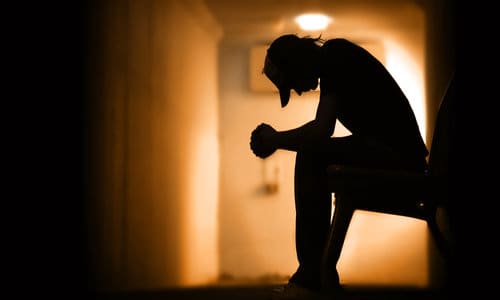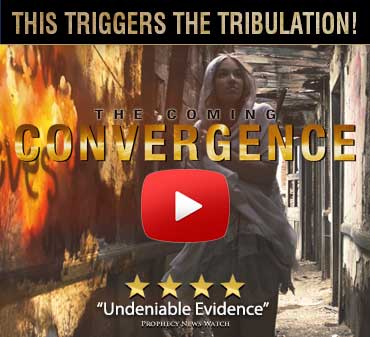Technology's Dark Side: Isolation and Depression
 By Michael Snyder/endoftheamericandream.com May 01, 2017
Share this article:
By Michael Snyder/endoftheamericandream.com May 01, 2017
Share this article:
Do you ever feel like you have been completely
abandoned by the world? Do you struggle with feelings of loneliness,
isolation and depression? If so, you are far from alone.
Thanks
to technology Americans are more isolated than they have ever been
before, and as you will see below, this is really starting to cause a
major national crisis. Humans were designed to be social creatures, and
researchers have found that a lack of interaction with others can cause
major mental, emotional and social problems.
Not
only that, it can also lead to premature death. We actually have a
need to love others and to be loved by them, and if those needs are not
met the consequences can be quite dramatic.
Unfortunately,
our society has evolved to the point where we hardly interact with one
another anymore. First of all, the size of the average household has
declined from about 4.5 people to about 2.5 people over the past 100
years, and we lead the world in the number of one person households.
So for most of us, the number of people that we interact with in our homes is quite limited.
For
children, at least there is quite a bit of interaction with others at
school, but once you become an adult things are very different.
Most
adults get up in the morning and drive by themselves to work. Even if
you take mass transportation, it is very rare to actually have a
meaningful discussion with anyone.
I remember the days when I would take the Metro into
Washington D.C. every morning, and most of the time there was complete
silence even though the trains were usually completely packed during
rush hour. Most people would either close their eyes, read a book or
spend the entire trip staring into their phones.
I
have to say that cell phones have probably done more to damage real
human interaction than almost any other invention in human history. So
many people just walk around like zombies obsessively staring into their
little phones while life goes on all around them. And it is the worst
with young people.
For some of them, it is
virtually impossible to get them to put those things down long enough to
have a real conversation with them.
Once most
Americans get to their places of employment there is some human
interaction, but it is generally limited to topics related to work.
Yes, some very deep and meaningful relationships can be built at work,
but these days that is fairly rare.
At the end
of the day, most people get back into their vehicles and head home.
Perhaps a stop is made for a quick shopping trip, but randomly engaging
other shoppers in conversation is not something that is typically done.
In
the evenings, the vast majority of us spend several hours staring into
our flickering television sets consuming whatever "entertainment" the
corporate media giants have concocted for us.
Like
the cell phone, the television has been one of the worst things to ever
happen to human interaction. In the old days, families would sit out on
their front porches and get to know their neighbors, but these days a
lot of people don't know their neighbors at all.
What
I am trying to point out is that we have become a deeply lonely nation,
and some are describing this as "a public health crisis"...
Truly,
a public health crisis is in the making. Transcending all demographics,
loneliness is an epidemic which is literally killing us. After
35 years of multiple studies, Brigham Young University researchers have
found that loneliness and isolation increase the likelihood of premature
death by 32 percent (on par with the risk of obesity).
In
our ever "connected" world of the Internet and social media, reaching
out to someone is as easy as tapping a few buttons, but the amount of
people that say they have no one to talk to has tripled in the last 20
years.
In addition to greatly
increasing your risk of dying early, loneliness has a whole host of
other negative health effects as well...
Research
indicates that perceived social isolation (i.e. loneliness) is a risk
factor for, and may contribute to, poorer overall cognitive performance,
faster cognitive decline, poorer executive functioning, increased
negativity and depressive cognition, heightened sensitivity to social
threats, a confirmatory bias in social cognition that is self-protective
and paradoxically self-defeating, heightened anthropomorphism and
contagion that threatens social cohesion.
I don't know what all of that means, but it sounds really bad.
Sometimes I wish that scientists would just speak to us in plain English.
Loneliness is particularly chronic among the elderly. The following comes from the New York Times...
"The
profound effects of loneliness on health and independence are a
critical public health problem," said Dr. Carla M. Perissinotto, a
geriatrician at the University of California, San Francisco. "It is no
longer medically or ethically acceptable to ignore older adults who feel
lonely and marginalized."
In Britain and
the United States, roughly one in three people older than 65 live alone,
and in the United States, half of those older than 85 live alone.
Studies in both countries show the prevalence of loneliness among people
older than 60 ranging from 10 percent to 46 percent.
If you have a parent or a grandparent that is living alone, please visit them on a regular basis.
You may never know how much it means to them.
Of course loneliness is a big problem on the other end of
the age spectrum as well. The following comes from U.S. News &
World Report...
The American Freshman Survey
collected responses from about 153,000 full-time, first-year students
at more than 200 four-year public and private institutions in 2014. An
increasing number of students - now 38.8 percent - said they spend less
than five hours each week with friends, while just 18 percent said they
spend more than 16 hours weekly with friends.
It's
the opposite of the picture student responses painted in 1987, when
two-thirds said they spent more than 16 hours each week socializing.
Those
numbers are absolutely staggering. Because so many of us are feeling
so lonely and so isolated, it should come as no surprise that depression
is at epidemic levels in this country.
In
fact, the number of Americans that have been formally diagnosed with
depression is increasing at a rate of about 20 percent a year, and at
this moment approximately one out of every six Americans is on an
anti-depressant or some other sort of psychiatric drug.
According
to the New York Times, more than 30 million Americans are currently
taking antidepressants, and each year more than 250 million
prescriptions for antidepressants are issued.
As
technology takes over our lives, the trends that I have discussed in
this article will likely accelerate even more, and our need for real
human interaction will become even greater.
So make it a point to reach out and love those around you, because our world is becoming a very cold place.

No comments:
Post a Comment